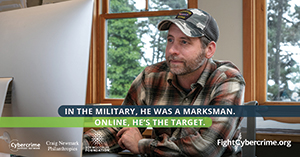 DAV teams up to arm veterans, families against online criminals
DAV teams up to arm veterans, families against online criminals
With just two weeks left in Army Sgt. 1st Class Collin J. Bowen’s 2007–2008 deployment to Afghanistan, his patrol vehicle struck an improvised explosive device (IED). While he was hospitalized at Brooke Army Medical Center in San Antonio, Texas, his wife, Ursula Palmer, took to the internet to update family and friends on Bowen’s condition as he underwent multiple surgeries.
Several months after the explosion, Bowen died due to complications from his injuries. Soon after, the website became a permanent memorial to the late soldier—and a target for cybercriminals.
“That following year, four different women contacted me,” said Palmer. “They asked me, ‘Is this person on this website real?’ They then asked if he indeed was a soldier who had died.”
These four women had all been contacted by an account using Bowen’s photo—the same image used on the website just one year earlier.
They were all victims of someone posing as Bowen on different dating sites. The scammer had defrauded the women of cash, valuables and their sense of security. Just as quickly as Palmer could get one fake profile taken down, she would see her husband’s photo appear on another site.
“There was nothing I could do,” said Palmer. “I didn’t even know I was a victim of cybercrime.”
The cyberattack set Palmer down a path to help keep others from being victimized. Over a decade later, Palmer serves as executive director of Military and Veteran Programs for Cybercrime Support Network (CSN), Partnership to FightCybercrime initiative. Palmer, a DAV HillVets Fellow, worked closely with DAV’s legislative team and knew where she could turn for help.
In 2021, DAV became the first veterans service organization to join the Partnership to FightCybercrime, which has grown to include other prominent military and veterans service organizations, corporations, foundations and federal agencies.
“DAV is proud to be partnering with a program like FightCybercrime,” said National Adjutant Marc Burgess. “We want to be there for veterans as we educate ourselves on how to fight back against cybercrime, as we know our community is one that is heavily targeted for this type of crime.”
 Many scammers will access online government records such as benefit programs and private information about veterans. These vulnerabilities are used for extortion, identity fraud, real estate frauds, charity fraud and personal data phishing.
Many scammers will access online government records such as benefit programs and private information about veterans. These vulnerabilities are used for extortion, identity fraud, real estate frauds, charity fraud and personal data phishing.
Reports made to the Federal Trade Commission show that U.S. military personnel, veterans and their families lost $822.1 million to cybercrime between 2017 and 2021, with a median financial loss due to fraud that is 44% higher for veterans than other civilians. According to the FBI, cybercrimes are one of the fastest-growing crimes in America, with synthetic identity theft—the same crime that Palmer found herself targeted by—being the highest.
The initiative’s Military and Veteran Programs group educates and mobilizes the community to recognize, report and recover from cybercrime, through the help of organizations where these populations are already engaged.
“The veteran community respects DAV,” said Kristin Judge, CSN CEO and founder. “The CSN team has expertise in cybercrime and cybersafety. We know that having partners who are experts in those we aim to serve will be the best messengers of our content. We don’t have time to waste with cybercrime growing exponentially. Working with partners who have earned the trust of the veteran community will allow us to reach those who need help faster.”
Learn more
For more information on cybercrimes and how to combat them, visit www.dav.org/veterans/resources/veteran-scams.
PROTECT YOURSELF
Ways to safeguard against scams
There are three golden rules that can help safeguard against potential scammers.
- Slow it down. Scammers often create a sense of urgency so they can bypass our better instincts.
- Do your research. If someone claims to be calling from the bank or VA, then call them back on an official number. Do not call the number they used to contact you.
- Stop. Do not send. Many scammers ask for money orders or gift cards. No reputable agency or company will take these forms of payment.
Common online scams
Charity Imposter Scams
Fraudulent charities target service members, veterans or their families asking for financial support.
Family/Friend Imposter Scams
Someone claiming to be from the military calls and says your loved one needs money immediately.
Fake Military Job Scams
Many job scams seem ideal for veterans or military family members who are constantly moving.
Education/Scholarship Scams
Scammers will impersonate organizations in order to take advantage of the GI Bill and other education benefits.
Rental/Real Estate Scams
People posing as landlords will request money or ask for deposits on nonexistent properties.






